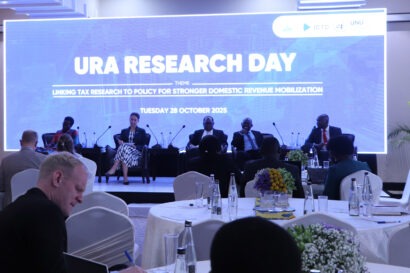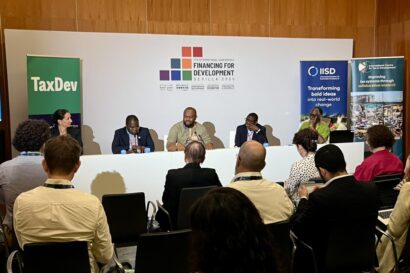Nigeria has taken a landmark step in overhauling its tax and revenue systems with the passage of four sweeping new tax laws, an achievement in which an alumnus of ICTD’s Research on Tax and Development course has played a formative role.
Rafat Gambo, who completed the ICTD course in 2019/21, has served as Secretariat Lead of the Tax Law Reform Sub-Committee under the newly established Joint Revenue Board (JRB). Since August 2023, Gambo’s team has coordinated the Secretariat of the Presidential Fiscal Policy and Tax Reform Committee, the national task force charged with reviewing Nigeria’s tax architecture and proposing major legislative reforms.
“The ICTD course was instrumental in preparing me for this moment,” said Gambo. “It gave me the analytical tools, the policy lens, and the regional perspective to contribute meaningfully to national reform. What we’ve achieved over the past year is a testament to the power of investing in tax capacity.”
This reform effort reflects the kind of impact ICTD aims to support through its flagship Research on Tax and Development course which equips government officials, researchers, and civil society actors with advanced knowledge on taxation in the Global South. As part of ICTD’s commitment to nurturing joint teaching and learning opportunities on tax and development, the course provides diverse methodological training, thematic content on issues like tax and gender, informality and international taxation, and mentorship to support participants in developing their own research projects. Delivered by leading tax researchers and practitioners, the course focuses on evidence-based reform, inclusive tax systems, and context-appropriate solutions. In fact, many alumni have since gone on to lead major reforms in their own countries.
Nigeria’s tax reform bill
Gambo is now among those alumni helping to shape tax policy at the highest level. The reforms he helped steward culminated in the signing, on June 26, 2025, of four key bills into law by President Bola Ahmed Tinubu:
- The Nigeria Tax Act – harmonises existing tax laws into a single, streamlined statute.
- The Nigeria Tax Administration Act – standardises tax procedures across government levels through a uniform legal and operational framework.
- The Nigeria Revenue Service (Establishment) Act – replaces the Federal Inland Revenue Service (FIRS) with a more autonomous, results-driven agency – the Nigeria Revenue Service (NRS).
- The Joint Revenue Board (Establishment) Act – establishes a new body to improve coordination across all revenue authorities and expand oversight beyond Personal Income Tax. The Joint Revenue Board (JRB), successor to the former Joint Tax Board, will also house key accountability mechanisms including the new Tax Appeal Tribunal and the Office of the Tax Ombuds, to ensure equitable treatment for taxpayers, especially the vulnerable.
With an effective date of January 1, 2026, the new laws are expected to strengthen domestic resource mobilisation, improve the business climate, and attract foreign investment, while delivering a more transparent and inclusive tax system. This is especially important for lower- and middle-income countries in the current climate of declining aid and the historically high cost of debt servicing, as highlighted during the 4th International Financing for Development Forum in Seville.
ICTD congratulates Rafat Gambo, and all partners involved on this milestone. His leadership is testimony the growing impact of ICTD’s capacity development work across Africa and the global South.



